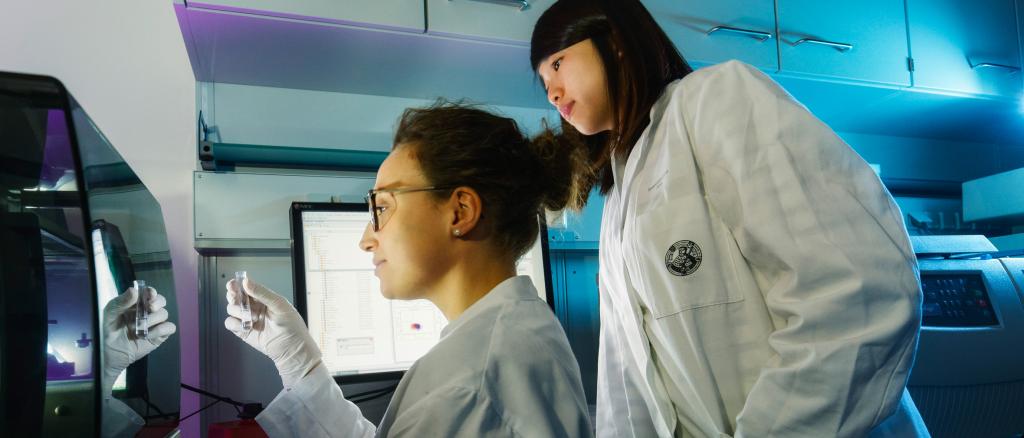
EKFS wants to arouse enthusiasm for research among interested and talented university students working toward a degree in medicine. Through the doctoral programs students receive the opportunity to carry out a demanding doctoral candidacy and become acquainted with career paths in science. Each of the following three doctoral programs in Jena, Mainz and Regensburg, Germany receives a grant amounting to 900,000 euros.
AURA: Autophagy – Recycling, Repair, Defense (Jena University Hospital)
Autophagy is an intracellular process in which misfolded proteins or damaged cell organelles are degraded and their component parts recycled. This process takes place in all of the body’s cells in the sense of permanent cell repair, and is greatly intensified when certain situations occur. In the case of many diseases, including cancer along with cardiovascular, neurodegenerative, metabolic and other disorders, this autophagy is impaired. In the course of the doctoral program students pursuing a degree in medicine are introduced to the subject of autophagy within the scope of a structured qualification program and work on doctoral projects which deal with the mechanisms of autophagy and regulation thereof, as well as the consequences of impaired autophagy. This way doctoral candidates are made familiar with experimental medical research and motivated to contribute towards boosting clinically oriented autophagy research. In the long term, this equally entails aspiring towards academic careers in university hospital medicine.
Applicants: Prof. Dr. Christian A. Hübner, lead spokesperson, is Director of the Institute of Human Genetics and Vice-Dean of Research. Deputy spokesperson is Prof. Dr. Regine Heller, Group Leader at the Institute of Molecular Cell Biology and Vice-Dean of Promotion of Young Researchers in Jena.
ImmunYoAge: The Immune System – Young versus Aged (University Medical Center Mainz)
Certain illnesses present themselves differently from a clinical viewpoint, depending on whether they occur in young people or the elderly. This particularly applies for diseases afflicting the immune system, for example certain rheumatic diseases or atopic dermatitis (skin conditions), yet the same is true of leukemia in juveniles and adults. The aim of this doctoral program is to map out molecular determinants for the age specificity of immune-mediated diseases. They are intended to help gain a better understanding of the causes for the different courses diseases take and build upon this to develop new therapies. In the program one doctoral candidate in medicine and one in natural sciences will work jointly on one project. Fundamental knowledge in natural sciences and methodological expertise will be contributed by scientists, the clinical issue in question and access to specimen material from patients via medical professionals.
Applicants: Prof. Dr. Julia Weinmann-Menke, lead spokesperson, is Head of the Dept. of General Nephrology and Kidney Transplantation and Academic Director of the Mainz Research School of Translational Biomedicine (TransMed). The deputy spokespersons are Prof. Dr. Stephan Grabbe, Director of the Dept. of Dermatology, Polyclinic and Research Center for Immunotherapy, and Prof. Dr. Klaus Lieb, Director of the Dept. of Psychiatry and Psychotherapy, and Scientific Director of the Leibniz Institute for Resilience Research.
TALENT: Dysfunctional ion homeostasis – Superordinated analogies of different cell types and diseases (University Hospital Regensburg)
Variations of intracellular Na+ und Ca2+ metabolism play a decisive role in the case of numerous diseases, for instance of the lung, the kidney, the immune system and the heart. Since these ionic dysregulations frequently have similar mechanisms as the underlying causes, it is sensible to research these variations not solely on an organ-specific basis but on an interdisciplinary level as well. The focus of the research projects within the scope of the program lies on the identification of potential analogies and similar signaling pathways for different organ systems. In joint cooperation with the Faculty for Biology and Preclinical Medicine it is intended that an innovative doctoral program comes into being that addresses students pursuing a degree in medicine early on – readily in the course of the preclinical stage of studies – and subsequently prepares them for scientific work.
Applicants: Prof. Dr. Stefan Wagner, lead spokesperson, is Professor for Translational Cardiology and Senior Physician at the Dept. for Internal Medicine II of University Hospital Regensburg. Deputy spokesperson is Prof. Dr. Frank Schweda, holder of the Chair for Physiology II and Managing Director of the Institute for Physiology at the University of Regensburg.